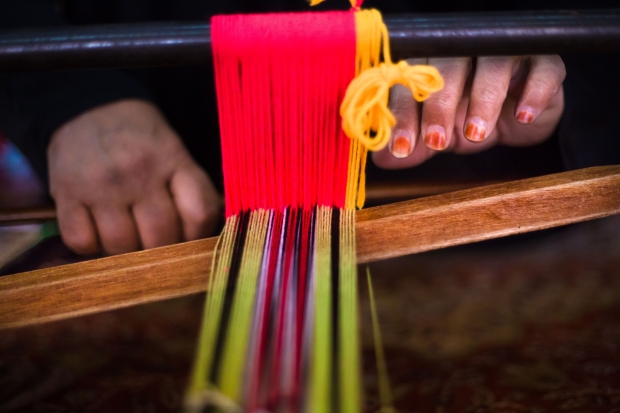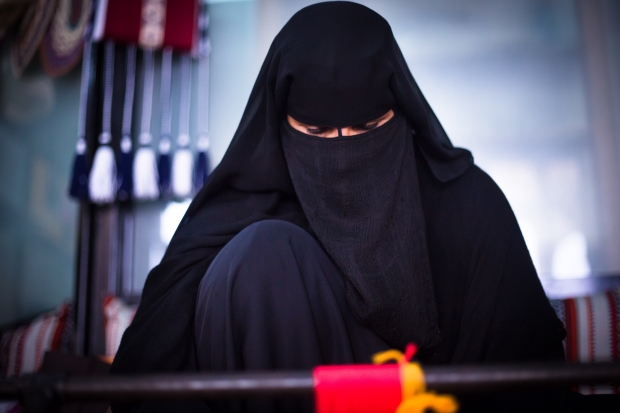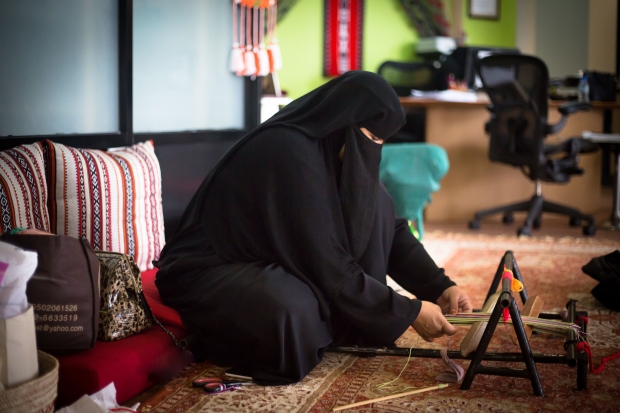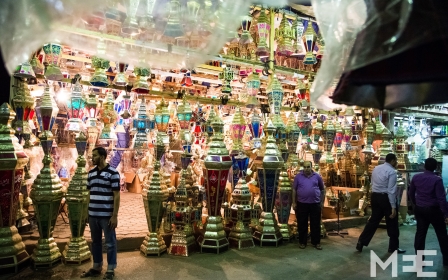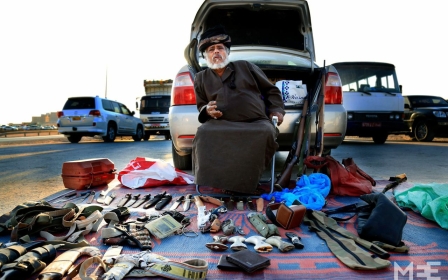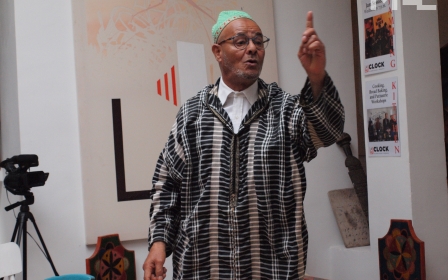History in their hands: UAE’s skilled craftswomen are a dying breed
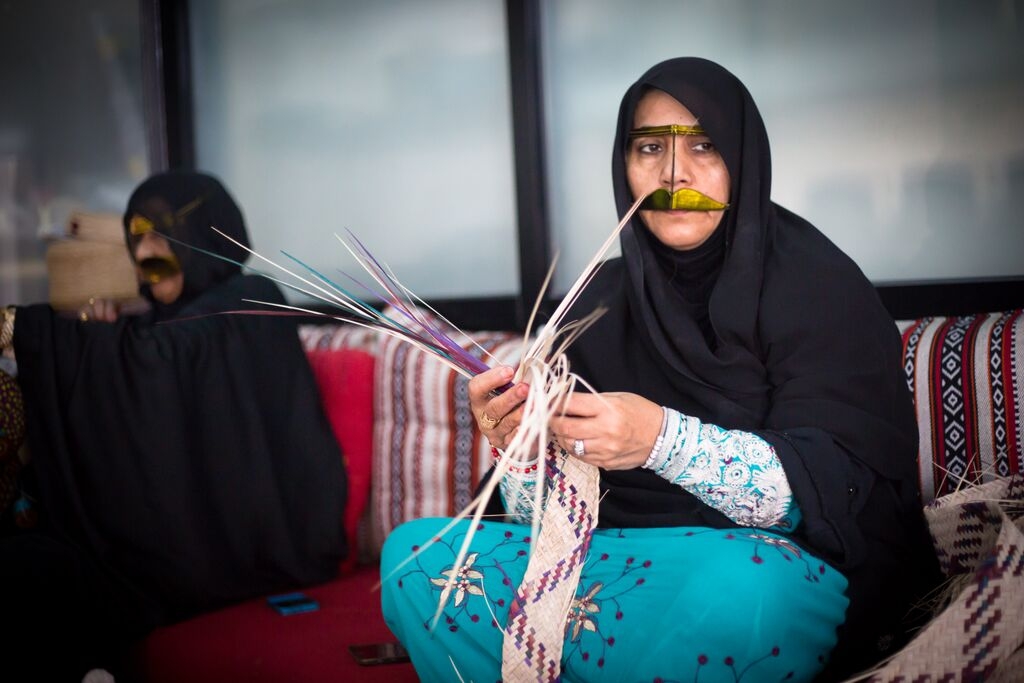
We have two hands, it is said, for a good reason: one with which to receive, and the other with which to give.
As MEE watches eight Emirati craftswomen, each of their 16 hands moving in its own mesmerising rhythm, these hands appear animate objects from which the rest of their bodies extend.
But highly skilled crafts like Al Sadu weaving, learnt at the knees of mothers and aunts, passing on like a relay baton across the generations, are dying; there aren’t enough young hands reaching out to receive the hermetic skills.
In 2011, Al Sadu weaving - a Bedouin tradition that formed the literal building blocks of historical life - was inscribed on UNESCO’s List of Intangible Cultural Heritage in Need of Urgent Safeguarding. The list contains cultural traditions that “require urgent measures to keep them alive”. At the time of inscription, UNESCO cited recent government surveys suggesting there were only between 150-200 weavers left in the country, “nearly all in the age group 50 to 70 years of age”.
Afra Saeed al-Mansouri is one of those women.
Al-Mansouri - who is now “45, perhaps” according to Safeya al-Qubaisi, her boss and the handicraft development supervisor at Abu Dhabi’s Tourism & Culture Authority - learned to weave at age 10 or so. Ages are hard to ascertain in a generation where birth certificates did not exist and events were marked simply by their proximity to other events.
The Bedouin woman who grew up in a community that stretches across the UAE border in Saudi Arabia has known the intricate art of Al Sadu, which took her five years to master, practically since she was born.
“When she opened her eyes when she was little she would see her mother and grandmother making this one,” al-Qubaisi says, pointing to the weaving al-Mansouri is engaged in.
The mother-of-seven spends about six hours each day on the labour-intensive craft in a room at Abu Dhabi’s National Theatre, where a programme is run to promote such crafts – not easy in a country struggling to retain a sense of identity amid an expatriate population of about 90 percent, where the value of imported goods and services comprise 86.1 percent of GDP.
Bedouin craft
Historically, Al Sadu weaving was used to make the tents the nomadic Bedouins set up home in, as well as carpets, pillows, camel- and horse-saddle coverings and decorations, among other things.
Wool, once made from shorn domestic animals but now more often imported from overseas, is threaded on a loom before the weaver weaves other wool under and over the base threads in the form of memorised geometric patterns that depict objects like trees, animals and scenes from desert life.
“I was taught by my mother and my aunties. The work is good and satisfying,” al-Mansouri explains.
She earns about $3,300 a month for this work - not much in a country where average wages for expats are $4,600 – and far higher for locals – but far in excess of what she ever expected. She moved to Abu Dhabi with her children after her husband took a second wife about 20 years ago, moving in with her brother-in-law. Along with schooling, there were other luxuries like electricity and air conditioning.
“Now I’m very happy. Now my children live with me, in the same house, and I’m free, I can go when I want to go.
“I don’t need to ask my husband, I’m for myself.”
Her job gives her the freedom of her own money and she also has the opportunity to travel widely to attend exhibitions the government receives invitations to, having visited places like China, the UK and Morocco.
But al-Mansouri has a rare skill. Most of the few women left with such expertise, like al-Mansouri’s own sisters, mother, aunts and cousins, live in rural places.
Al-Qubaisi is on the hunt for more; of the 13 women currently in her charge, only two can do Al Sadu. The rest make decorative garments using Al Talli embroidery and baskets and other products by palm weaving.
“I’d like to bring many ladies. I need more like Afra.”
Women needed
She says if she could find six such women, then she could start bringing in younger women to learn from the older generation. But first the salaries would need to improve.
Al-Mansouri has three daughters of her own, but they work in high-paying government and teaching jobs.
“I need the government to give more salary,” al-Qubaisi explains, saying salaries need to be closer to the $5,500 mark to be competitive. “You can’t see the ladies, young ones, to work like this now.”
Modern life has stopped the traditional transmission of skills that used to happen as sure as the setting of the sun. The work is time-consuming and with the limited workforce available it is not possible to generate revenue streams through commercial production.
“Maybe it takes two months [for one woman] to do eight pillows. If I had 30 ladies I can fill the order by hand. But where? Where are 30 ladies?”
While imported goods may be cheaper and more accessible, the market would be there, al-Qubaisi insists, if only she could get the workforce.
Now somewhere in her mid-70s, Haleema Obaid al-Shehi is al-Qubaisi’s oldest employee. She does Al Talli and palm-weaving but only started work after her husband died about eight years ago, when her peer group around the world was already in retirement.
“I work because I like to come here to work with my friends,” Al Shehi explains.
A sociable skill
The grandmother, who grew up on the coast of Ras al-Khaimah, is the first craftswoman to arrive in the mornings and the last one to leave in the afternoons.
“When I came in 2006 to Abu Dhabi I took this job. I am happy because I have a job, somewhere to come.”
Like al-Mansouri’s daughters, al-Shehi’s daughter has limited knowledge of the craftwork of her mother. But al-Shehi understands.
“She has work and she has the house. I learned when I was small how to cook, how to look after the house and how to make palm tree weaving – I didn’t go to school.”
But if she had her time over again?
“I wish if I was small again I could go to school.”
And herein lies the problem involved with keeping these traditions alive, traditions that are being overlooked as younger women open doors to high-paying careers. But what shouldn’t be forgotten is these women have the history of a culture alive in their hands.
As I get ready to go, Al Mansouri’s beautiful hands reach out. With one hand she holds out an Al Sadu bracelet; with one hand I receive it.
New MEE newsletter: Jerusalem Dispatch
Sign up to get the latest insights and analysis on Israel-Palestine, alongside Turkey Unpacked and other MEE newsletters
Middle East Eye delivers independent and unrivalled coverage and analysis of the Middle East, North Africa and beyond. To learn more about republishing this content and the associated fees, please fill out this form. More about MEE can be found here.


